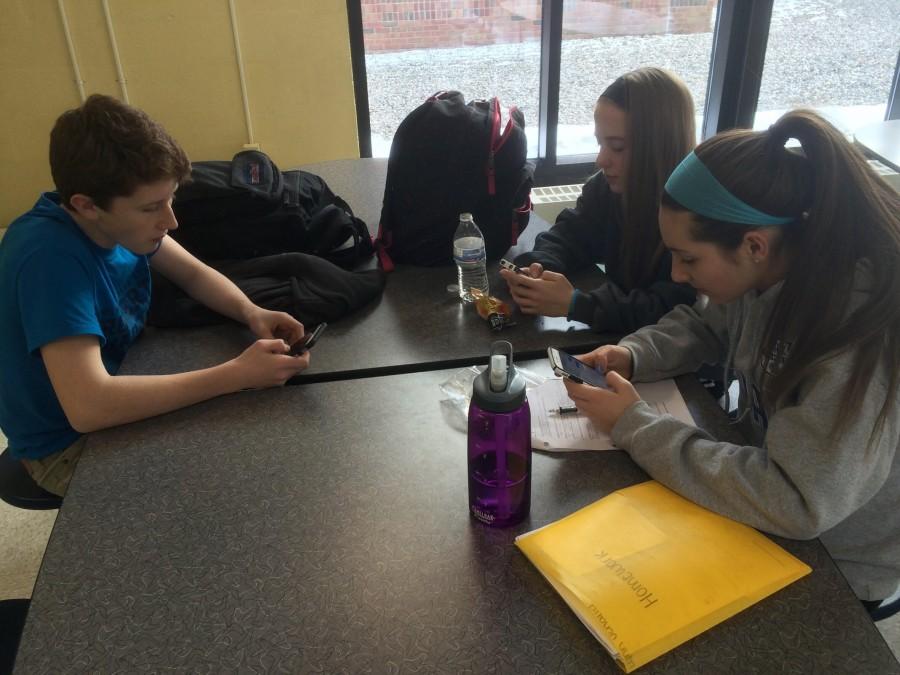Spelling on the Decline
January 14, 2016
As technology advances, students become increasingly reliant on spell-correcting technology. Let’s face it. With auto-correct and spellcheck technology on phones and computers, it’s easier to slack off when spelling something. For instance, if I typed “sprllimg” when texting a friend, auto-correct recognizes that I’m most likely trying to spell “spelling” instead. It’s both incredible and alarming how our phones can recognize a jumbled mess of a word and fix it instantaneously. It’s for this reason that as newer generations are presented with the task of having to compose a piece of writing without the help of spell correcting technology, they scribble “words” that only resemble their correct spelling.
Indeed the days of proper spelling inherent in students everywhere are behind us. For instance students of today have to think twice about spelling “cause” as opposed to “cuz”. When asked if he had noticed a decline in spelling capabilities of his students, recently retired English teacher of 34 years Dan Wilcox replied, “It was only after about 20-25 years in when I noticed it, but yes, it gradually got worse and worse right up until the moment I retired.” He paused for a moment then said with chagrin, “I can only imagine the decline since my departure five years back.” Although Mr. Wilcox had taught for just over three decades, it doesn’t take a seasoned English teacher to notice the effect spell-checking technology has had on the younger generation.
High school students are collectively possibly the largest committers of such egregious crimes on the written word. As a senior at Lewis Mills, Austin Gilbert shed some light on the topic at hand:
“I was never a good speller to begin with, but ever since I got an iPhone in seventh grade, I’ve experienced lapses from time to time when I try to spell words I never had problems with before.” Perhaps if it weren’t for auto-correct fixing the words Austin regularly misspells, he wouldn’t be so clueless as to how to spell them when need be.
Likewise, Austin’s long-time friend and neighbor Freddy Marinelli offered similar commentary, saying, “Yeah I’m pretty confident I could spell better before I got an iPhone. It just came to me more naturally before.” Clearly, lessened spelling capabilities have extended past students using computers and have hampered young texters who have relied on auto-correct since receiving their smart phones.
Sadly, the plague of poor spelling doesn’t end there. College students enrolled in schools most would kill to gain acceptance from have fallen prey to aforementioned plague. George Washington University sophomore honor student Catie Jennetta revealed that even as competitive as the environment at George Washington is, spelling doesn’t come as easy as you think it would at a school as competitive as GW. “My dorm roommates and I all maintain a 4.0 GPA here and there isn’t one of us who are completely confident that a finished essay is without any spelling errors.” Emanating a sort of embarrassed feel, she continued, “There isn’t one of us who don’t have to spell check the entire the entire piece before we can confidently hand it in free of any errors.” She admitted her college life would be a tad easier without the constant grey area that spelling has become for her and other college students alike.
There’s a reason that adults who predate the technology too easily available to the generation of today have antiquated spelling prowess, and grammar too, but that’s for another essay…Students and essentially anyone who writes today who is of the younger generation have been graced by technology that facilitates our everyday life, and advances in complexity daily. However, with this technology comes affects that certainly bare issues on the people that rely on them. Today’s society has become dependent on spell-checking technologies, making spelling without them significantly more difficult compared to pre-auto-correct era. But what does this mean going forward? Does spelling even matter in the society we live in today?
According to veteran career readiness teacher Kristen Grindal Keller, yes it does. “It’s very concerning for kids applying for jobs because employers are looking for people who can articulate themselves”.
Even so,Wordnik founder and lexicographer Erin Mckean argues, “If a word is persuasive enough, and if your usage is provocative enough and feels real enough, you can make a word mean what you want it to mean.” In other words, she feels that spelling is no different, and that historically, spelling mistakes have played a significant role in the evolution of the english language. But as Wired’s copy editor Lee Simmons put it, “When what you’re writing actually matters; when you want to earn the reader’s trust by signaling that you’ve put real care into your blog post; and ultimately, when you care more about the reader’s experience than your own in writing it, you’ll make that small extra effort.”
Teachers, students, texters, website founders and editors have spoken. They’ve cited numerous examples of how auto-correct and spellcheck are deteriorating their users’ spelling abilities. At some point not only will writing or texting be difficult without the help of auto-correct, it will become impossible. Now is the time to start implementing certain panaceas in an effort to stop spelling deterioration in its tracks.
